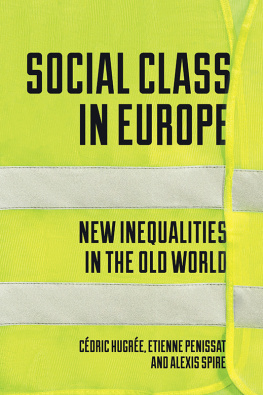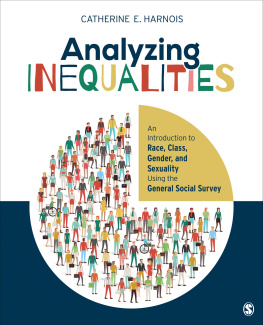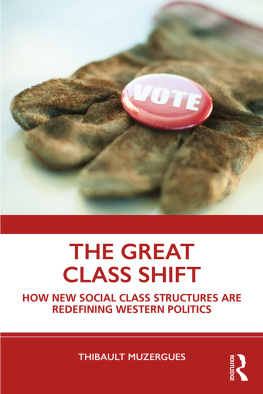Contents

SOCIAL CLASS IN EUROPE
SOCIAL CLASS
IN EUROPE
NEW INEQUALITIES IN THE OLD WORLD
CDRIC HUGRE, ETIENNE PENISSAT
AND ALEXIS SPIRE
TRANSLATED BY RACHEL GOMME
WITH EUNICE SANYA PELINI

First published in English by Verso 2020
First published as Les Classes sociales en Europe. Tableau
des nouvelles ingalits sur le vieux continent
Editions Agone 2017
Translation Rachel Gomme with Eunice Sanya Pelini 2020
All rights reserved
The moral rights of the authors have been asserted
1 3 5 7 9 10 8 6 4 2
Verso
UK: 6 Meard Street, London W1F 0EG
US: 20 Jay Street, Suite 1010, Brooklyn, NY 11201
versobooks.com
Verso is the imprint of New Left Books ISBN-13: 978-1-78873-628-2
ISBN-13: 978-1-78873-627-5 (LIBRARY)
ISBN-13: 978-1-78873-630-5 (UK EBK)
ISBN-13: 978-1-78873-629-9 (US EBK)
British Library Cataloguing in Publication Data
A catalogue record for this book is available from the British Library
Library of Congress Cataloging-in-Publication Data
Library of Congress Control Number:
2020932681
Typeset in Minion by Hewer Text (UK) Ltd, Edinburgh
Printed and bound by CPI Group (UK) Ltd, Croydon CR0 4YY
Contents
AT: Austria
BE: Belgium
BG: Bulgaria
CY: Cyprus
CZ: Czech Republic
DE: Germany
DK: Denmark
EE: Estonia
ES: Spain
FI: Finland
FR: France
GR: Greece
HU: Hungary
IE: Ireland
IT: Italy
LT: Lithuania
LU: Luxembourg
LV: Latvia
NL: Netherlands
PL: Poland
PT: Portugal
RO: Romania
SE: Sweden
SK: Slovakia
SL: Slovenia
UK: United Kingdom
EC: European Community
ECB: European Central Bank
EU: European Union
GDP: Gross Domestic Product
IMF: International Monetary Fund
OECD: Organisation for Economic Co-operation and Development
AES: Adult Education Survey
EWCS: European Working Conditions Survey
LFS: Labour Force Survey
EU-SILC: European Union Statistics on Income and Living Conditions
A first version of this book was published in French, entitled Les classes sociales en Europe (Paris: Agone, 2017). The initial idea came from Ccile Brousse, whose work inspired us a lot. Access to European surveys was first made possible by our participation in the ESEG research group at the Institut national de la SEE. Our three laboratories, CERAPS, IRIS and CRESPPA-CSU, provided us with logistical and financial support for the publication. Our bibliographical research benefited from the suggestions of several colleagues who helped us to better understand social class in different countries: Virgilio Borges Pereira, Bruno Monteiro, Angeliki Drongiti, Jani Erola, Mihaela Hainagiu, Micha Kozowski, Clemence Ledoux, Thomas Maloutas, Enrique Martin Criado, Pablo Lopez Calle, Harri Melin, Mikael Palme, Andreas Melldahl, Marie Plessz, Spyros Sakellaropoulos and Yiorgos Vassalos. Thanks to these correspondents, we were able to feed our demonstration of qualitative research conducted in different European countries.
Thomas Amoss, Philippe Askenazy, Audrey Mariette, Tristan Poullaouec and Delphine Serre reviewed all or part of the manuscript and offered us valuable suggestions. The remaining imperfections are obviously our sole responsibility.
The entire text was translated by Rachel Gomme, with the exception of , which were translated by Eunice Sanya Pelini.
The European Union has become the subject of intense conflict, as evinced by the no votes in the French and Dutch referendums on the constitutional treaty in 2005, the Greek debt crisis of 2010, and the vote for Brexit in June 2016. In every country in Europe, an enduring political split has opened up between supporters and opponents of the European project.or a Spanish manual worker, and what sets them apart from one another.
The aim of this book is to present a map of inequalities in Europe that goes beyond the usual comparisons between countries: drawing on statistical data that are very rarely analysed from the point of view of occupations, our aim is to give an account for the first time of the differences between social classes at the European level. Here, we would rather like to show how the national differences are embedded in a convergence of social inequalities that prevail in all European countries. In our view, the issue of inequality cannot be reduced to a simple analysis of levels of income and assets: it also relates to conditions of employment and work, lifestyles, housing conditions, cultural practices and leisure. These various domains of social life can now be measured through statistical studies conducted consistently in all European countries. Our task, then, is to consider the disparities between socio-economic and national groups, as well as gender and generational differences, together as a whole. Our commitment to an analysis in terms of social class is also a political act: more than just describing inequalities, our aim is to investigate the conditions of possibility of a European social movement.
Since the 1980s, while European integration has gathered pace, the representation of society in terms of social class has been consistently declining. In the West, the retreat of Marxism resulted in a decline in the use of this concept in public debate, while in the East the desire for a radical break with the vestiges of Stalinism made it a despised term.
On both sides of the continent, the outlines of social classes are less distinct than they were in the past. Changes in European economic structures have played a substantial role in this process. The decline of industry and the growth of the service and retail sectors, the continuing rise in jobs in management and intermediate occupations, as well as mass unemployment, have substantially blurred the boundaries between social classes, while marginalising the industrial proletariat which used to comprise the hard core of the working class. The extension of duration of studies, and the spread of media and digital technology, have also revivified forms of inequality between countries and within different European social groups.
On the political level, the disappearance of the communist states and the weakening of workers parties and trade unions in Western countries have to some extent delegitimised references to class struggle. More generally, people no longer use class as a way of locating themselves within the social space. Throughout Europe, the sense of belonging to the working class has diminished among manual workers and low-skilled white-collar workers,
The notion of class, articulated as the political and symbolic construction of a vision of the social world, In France, the Yellow vests (gilets jaunes) revolt that broke out in November 2018 put the working classes back at the centre of the public debate: starting as a challenge to increased fuel duty, the protest widened to demands around purchasing power and for the greater use of referendums. Several calls for extension to other countries were made, with unsuccessful attempts in both Wallonia (Belgium) and Poland. The confinement of the Yellow vests within French borders illustrates the difficulty faced by social movements in raising the issue of inequalities on a European scale.








